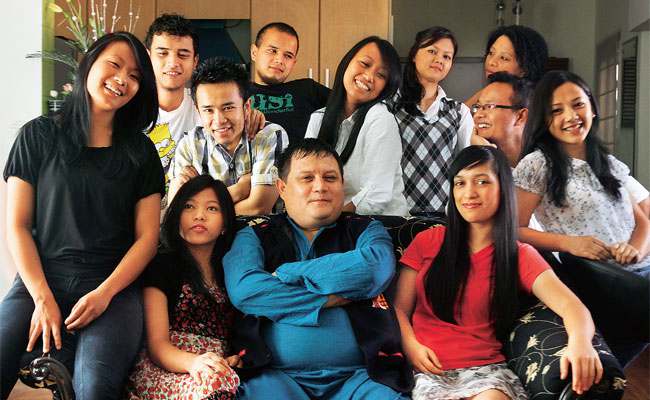Music is not the end of everything

The Sapping June heat doesn’t seem to perturb Neil Nongkynrih and his choir members as they perfect their octaves in Gurgaon’s plush Heritage City apartments, close to a mall. Occasionally they walk across to catch evening shows at the multiplex.
Comfortable in tee and shorts, Nongkynrih, 42, has discovered an indulgence other than music. He plays tennis every evening. “It’s to get back to being fit,” he says with smile, even as he chews on a mouthful of organic betelnut called kwai in Khasi.
His kwai fix, packed neatly in a steel container, is kept right next to him so that he can easily reach out for it every now and then. In the same room, stacks of sheet music and music books are piled up on tables. The choir members are busy. The girls are preparing lunch while the boys are tidying up their rooms.
Nongkynrih has just been invited to represent India at the World Choir Council, an apex body of choral music made up of delegates from more than 70 countries representing at least 1,20,000 choirs. And the man who founded and conducts the Shillong Chamber Choir, India’s most popular choir, is clear about his agenda.
“In some ways, my role will be to make sure that India, at some stage, hosts the World Choir Games, considered the Olympics of choir music,” he says. This July, the Shillong Chamber Choir has been invited to sing at the closing ceremony of the Games, in Cincinnati, USA. “Nothing would have been possible without our prayers,” he says. The choir members, by the way, pray together every Wednesday and Sunday.

Neil Nongkynrih (in blue) with members of the Shillong Chamber Choir. They have now been invited to sing at the World Choir Games in the United States
These days the choir is also working on four albums. Despite the heat, they make regular trips to the recording studio in Noida, and don’t miss a single practice session.
The four albums include Gospel (in six languages: English, Hindi, Khasi, Telugu, Malayalam and Tamil); a patriotic album that will incorporate Nongkynrih’s version of Vande Mataram; a Khasi album with their famous song inspired by Indian trains; and a 60-minute album of his compositions.
Musically, Nongkynrih loves to experiment. He is recording live with an audience to bring out the soul of music. “The beauty of music is to hear a slice of humaneness. Recording with a live audience has its charm,” says Nongkynrih, “Otherwise, what you get is synthetic.”
Music in his veins
Born in Shillong in 1970, Nongkynrih learnt to play the piano at three. The youngest of five siblings, he grew up watching his sisters play the piano and took to playing the instrument without formal training.
He was considered a child prodigy and he made his musical debut in Shillong in 1976 at age six. (One of the people in the audience was Bhupen Hazarika, the late musical legend from Assam). After studying at St Edmunds School in Shillong till 1984, followed by two years at the British School in Delhi, Nongkynrih attended the Delhi School of Music to learn how to read notes. There, he jumped grades and in one year was promoted from grade one to eight.
At 15, Nongkynrih won a national level piano competition in Pune. He went to the venue to listen to contestants and had no intention of participating. But a friend wrote down his name as a contestant and he was called in to play. All that he remembers after being called on stage was that he played badly. The next day, he was surprised to discover that he had been declared the winner. It was then that his bureaucrat father was finally convinced that Nongkynrih needed a piano to practice in Delhi.
In London, Nongkynrih studied at the Guildhall School of Music & Drama, Trinity College, between 1988 and 2001. “I started with St James Piccadilly with a solo recital but I was never happy just playing the piano,” says Nongkynrih who even scripted a musical that was staged. “But one thing was clear: I never envisaged myself as a choral conductor,” he adds.
In 2001, the choir was formed and it grew organically over the years. “I never imagined that we would go this far. It has been a blessing,” he says. Having performed in many parts of the world, including singing for the visiting American president Barack Obama in 2010, the choir’s journey has been remarkable; 2010 is also the year the choir won the television reality show India’s Got Talent, their first national-level victory.
Mentor at work
Nongkynrih’s role isn’t limited to showing choir members the right musical path. “I can’t stand arrogance and I can smell it from a distance. Music is not the end of everything,” he says. “They must grow up to be good human beings. I have to be their example. I cannot say one thing and not do it. I take the role of their parents. My concern is also to get the elder ones married off.”
His seven-bedroom Shillong home resembles a gurukul where students learn a holistic way of life. Ask soprano singer Ibarisha Lyngdoh, one of the youngest members. She came as a nervous 12-year-old who gave her audition on a rainy day. Today, at 19, she has travelled the world singing under her mentor’s guidance in different Indian languages as well as in foreign tongues. Similarly Ryan Lamin, 17, who joined the group at 14, is now a prominent bass singer with his deep voice.
With success, the choir has grown in confidence. Though the members are from a non-Hindi speaking region, they took audiences by storm when they sang in Hindi.
“In the beginning, I was unwilling to try it,” says Nongkynrih. “But once I did, there was no problem,” he admits. Interestingly, the experiment took place during India’s Got Talent. They had come prepared with English and Khasi songs and were told to sing in Hindi. “We learnt in an hour’s time. Then I realised that we could do well-known Hindi songs. But I took that as a leitmotif to create a choral sound around it,” says Nongkynrih. “I would never do anything just like that. You have to go deep into the subject.”
It’s time for another round of kwai.
From HT Brunch, June 10



